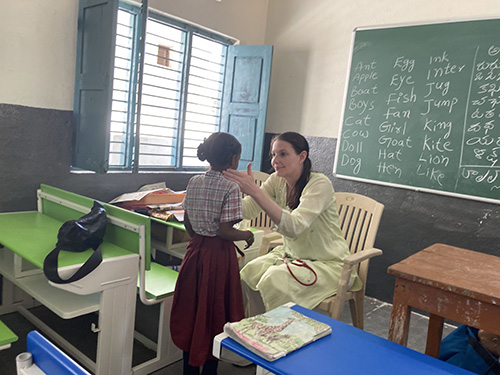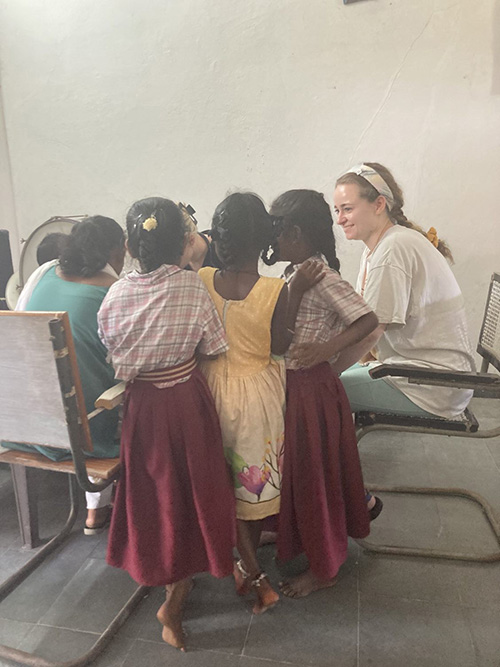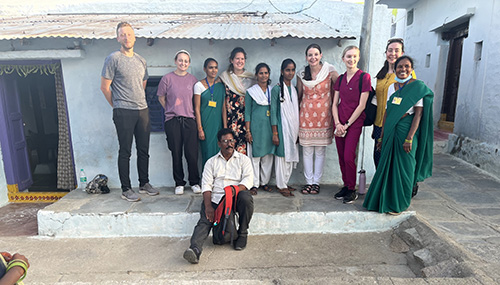
When she made the decision to come to WMed in 2022, second-year student Mara Miller said she was drawn to the medical school because of the emphasis placed on health equity and global health.
In March, that focus of “understanding our place in the larger world” as future physicians took on a whole new meaning for Miller and four of her classmates as they accompanied Priscilla Woodhams, MD, to India where they took part in a one-week global health elective.
“It was really awesome and eye-opening to see what health care is like in India, and to have those real-world opportunities available to help those that we cared for,” Miller said.
During their time in the country, Miller and Dr. Woodhams, along with M2s Drew Frase, Adrianne Holland, and Kayla (Keckler) Grooters, and M3 Carolyn Cooper, visited the villages of Dokur and Kotakadra in rural Telangana, South India. Under the guidance of Dr. Woodhams, they focused on treating and preventing iron-deficiency anemia in children and implementing the American Academy of Pediatrics’ Helping Babies Breathe training program.
The two initiatives taken on by Dr. Woodhams and the students were done in collaboration with – and at the request of – the Institute for Rural Health Studies (IRHS), an organization that provides preventive healthcare services to poor communities in Telangana.
“This really is an opportunity to work on health equity in an area of the world that really needs that,” said Dr. Woodhams, who is an assistant professor in the Department of Pediatric and Adolescent Medicine at WMed. “Students get the opportunity to see what it’s like working in a low-resource area. It is so different from what they experience here in the United States and, for me, the experience makes me stay on my toes with my clinical skills and thinking creatively.”
The trip to India in March was a return of sorts for Dr. Woodhams, who last visited Telangana in 2019 with a group of students that included Pooja Avula and Brinda Ryali. Avula and Ryali, who graduated from WMed in 2020, worked with Dr. Woodhams and the IRHS to launch the global health elective for first- and second-year students to help improve women’s health in India. The work in India held special importance for Avula and Ryali as they both have family in Hyderabad, India, and Avula lived there with her grandparents until she was six years old. Ryali also lived in India for more than four years and attended middle school and high school there, and visits the country regularly with her family.

Following the visit in 2019, the COVID-19 pandemic prevented return trips to India for the global health elective in 2020, 2021, and 2022.
“It was really wonderful to be able to go back because these are people in these villages that we’ve been thinking about throughout the pandemic,” Dr. Woodhams said of the trip in March. “Pooja and Brinda wanted to create this elective for students and it made me really happy to see their dream for the medical school come true,” Dr. Woodhams said.
As part of their efforts during the most recent trip to India, Dr. Woodhams and the students took test kits to check the hemoglobin levels of students at schools in the two villages. They also brought with them 100 Lucky Shakti leaves, a simple cooking tool that adds iron to foods and drinks. The group spent time at four different schools taking vitals and conducting well-child exams for about 50 children per school.
They also got the chance to examine and treat different skin rashes, as well as fungal and parasitic infections, pneumonia, and kidney stones. Cooper recalled one of the more serious cases the group saw was a young student whose leg had become seriously infected from a cut he suffered on his foot from stepping on a piece of glass. Cooper said by the time Dr. Woodhams examined the young boy he was septic and had to be taken by ambulance to a local hospital.
“I was really humbled to see how health care works in other settings,” Cooper said. “We have so many resources here and there we had to improvise.”
Holland, who completed her undergraduate studies in Canada and lived for a short time in New Zealand and Italy, said she was drawn to the opportunity to travel to India with the hope of gaining an appreciation for the lack of access people face in other parts of the world and how that impacts their well-being. Once there, she said she enjoyed the opportunity she and her classmates had to work with local paramedics and community health workers.
“It was an amazing opportunity and I think that working as future doctors involves us really understanding a diverse range of people and communities and this trip really challenges your understanding of different cultures and your knowledge of health and wellness,” Holland said.
Frase said the trip to India reminded him of the importance of being flexible and adaptable in his work as a future physician. He said the clinical experience the students gained is also invaluable as they prepare for rotations in their third and fourth years of medical school.

“The No. 1 thing was the clinical experience,” Frase said. “We saw more than 150 children on the trip and as M1s, most of our clinical experience is coming from standardized patients. Having actual interactions with patients in the clinic was really energizing along with getting to see medicine in a different way.”
In addition to their work to treat iron-deficiency anemia, Dr. Woodhams said she was extremely proud of the effort led by Grooters to implement the AAP’s Helping Babies Breathe training program. In a presentation the group gave during Grand Rounds for the Department of Pediatric and Adolescent Medicine on August 18, Grooters said the program aims to create a network of culturally competent and skilled birth attendants while providing protocols for evaluating and correcting birth asphyxia. Grooters said Helping Babies Breathe techniques can reduce infant mortality by as much as 47 percent and the implementation of the program provides a pathway for future trainings in India.
Dr. Woodhams said Grooters not only taught the community health workers in India the Helping Babies Breathe techniques, but also provided instruction that will allow those workers to train their colleagues.
“It was just magical,” Dr. Woodhams said.
Looking ahead, Dr. Woodhams said she plans to make a return trip to India with students in 2024 with a continued focus on iron-deficiency anemia, as well as a health camp for adults. She said she is also hopeful that faculty and residents from the medical school’s Family Medicine and Internal Medicine residency programs will take part.
“We can’t speak enough about how amazing it is going to the schools and working with the children,” during Grand Rounds on August 18. “It’s a really rewarding thing, it’s just remarkable.”
